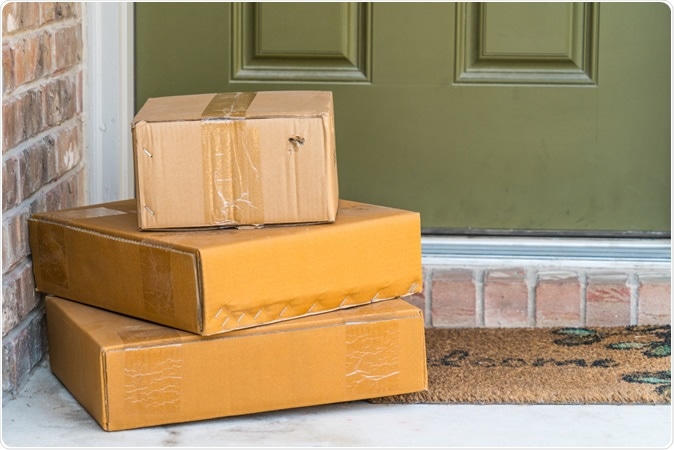Researchers have advised that people need to leave their parcels and packages unopened and untouched for 72 hours to help stop the spread of severe acute respiratory syndrome coronavirus 2 (SARS-CoV-2) that causes COVID-19 disease. The virus, as is evident from the raging pandemic across the world, is highly infectious and could survive on surfaces for up to 72 hours.
Researchers from Bath, Bristol, and Southampton have come up with a set of recommendations to prevent the spread of the infection between individuals. COVID-19 pandemic has infected over 4 million individuals worldwide and has killed nearly three hundred thousand. The virus is highly infective and most commonly spreads via the aerosols released when an infected person coughs or sneezes. Researchers have found that this virus can remain active on surfaces for up to 72 hours, and this allows these surfaces to be able to transmit the infection to an uninfected person easily.

Image Credit: Roschetzky Photography / Shutterstock
The 'Germ Defence' app
These guidelines have come from psychologists as well as various experts who have been part of the team working with Public Health England. These recommendations are available on the website called Germ Defence. The recommendations are being updated regularly by the universities and the impact of the virus on lives is also being taken into account.
This site is used by the general public who will be asked a series of questions and provided scenarios wherein they need to respond. After analyzing their risk and status, the users are provided with advice regarding the prevention of the spread of the infection, reducing the risk of getting infected and also preventing entry of the virus into their homes.
Some of the recommendations
Some of the recommendations offered on the website include:
- All packages and parcels received via post need to be kept unopened for up to 72 hours, the website says. This can reduce the risk of getting infection passed on from one person to another. The team explained on the website, "It can take up to three days (72 hours) for the coronavirus to completely die on hard surfaces – such as cardboard, plastic, or metal. If you can wait three days, then the risk of catching the virus is at its lowest. If you are receiving a delivery, can you put things in a spare cupboard for three days before you use them? If three days isn't possible, then aim for as long as you can – as soon as the virus leaves our bodies, it starts to die, so even after one day, it is much weaker than it was before."
- All surfaces around the home need to be regularly disinfected. High contact surfaces such as doorknobs, switches, handles, tabletops, remotes, etc. need to be specially cleaned routinely to prevent the spread of the infection from one person to another.
- Household members need to be especially aware of not spreading the infection between themselves by using separate towels.
Expert speak
According to Dr. Ben Ainsworth from the Department of Psychology at the University of Bath, "We know that COVID-19 is caught in the same way as other viruses. Germ Defence provides advice on how you can protect yourself using the same methods that have worked for other viruses." He added, "It only takes around 10 minutes to go through the information - but it could help protect you from coronavirus, as well as offer you a lifetime of fewer colds and flu. It may take a bit of practice for you and your family to use the ideas on Germ Defence. But once you have learned them, they will become habits that you'll do easily, which will protect you from becoming ill."
Professor Lucy Yardley, from the NIHR Health Protection Research Unit in Behavioural Science and Evaluation at the University of Bristol, in his statement, said, "Most people think that if a family member gets ill then it is just a matter of luck whether other people in the household get infected. But our team has shown that the people who follow the Germ Defence advice get fewer and less severe infections - and so do the people they live with. We hope the app will save lives by helping people avoid spreading coronavirus to family members."
Writing in the BMJ
The team of researchers wrote in the British Medical Journal (BMJ) recently saying the virus needs to be limited by breaking the chain of transmission. The people who come into contact with the virus by caring for someone at home with the infection, need to be protected.
The BMJ article was led by researcher Paul Little, Professor of Primary Care Research at the University of Southampton. He said, "We developed and trialed Germ Defence so that it could be widely disseminated both during normal winter months and also during a major pandemic. We showed clear reductions in both transmission of infections to other family members and also in transmission from other family members. It should help reduce both the number of family members who become ill with COVID-19, and also reduce the severity of illness if family members do become ill."
Sources:
Journal reference:
- Little Paul, Read Robert C, Amlôt Richard, Chadborn Tim, Rice Cathy, Bostock Jennifer et al. Reducing risks from coronavirus transmission in the home—the role of viral load BMJ 2020; 369 :m1728, https://www.bmj.com/content/369/bmj.m1728